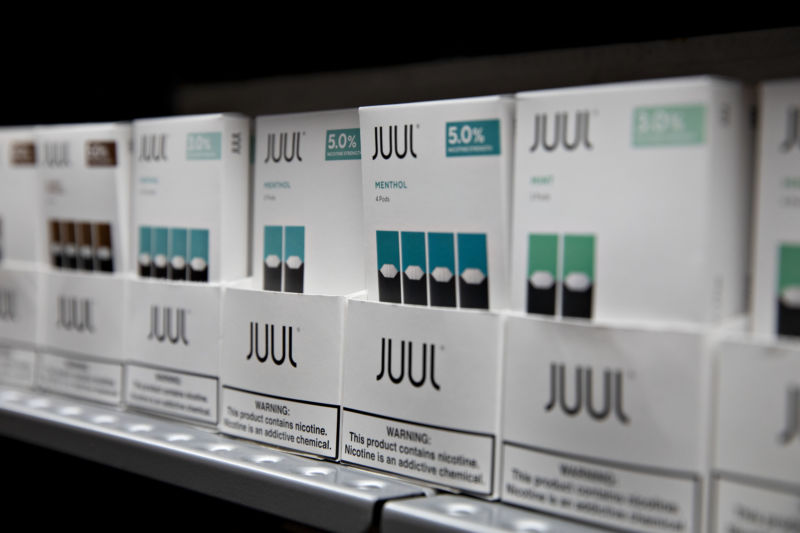
The Food and Drug Administration is reportedly preparing to deny authorization of Juul’s tobacco- and menthol-flavored products, effectively forcing the e-cigarette giant out of the US market, according to a report by The Wall Street Journal.
In their reporting, the Journal cited unnamed people familiar with the matter, who also said the FDA could announce its denial as early as today, Wednesday, June 22.
If the report is accurate, the move will come on the heels of an FDA announcement on Tuesday that the regulator is working on plans to establish a maximum nicotine level for cigarettes and other combusted tobacco products. It’s a move aimed at making the products less appealing to youth, less addictive, and less deadly.
“Nicotine is powerfully addictive,” FDA Commissioner Robert Califf said in a statement. “The US Surgeon General has reported that 87 percent of adult smokers start smoking before age 18, and about two-thirds of adult daily smokers began smoking daily by 18 years of age. Lowering nicotine levels to minimally addictive or non-addictive levels would decrease the likelihood that future generations of young people become addicted to cigarettes and help more currently addicted smokers to quit.”
Juul has become notorious for its links to youth vaping, skyrocketing to “epidemic” levels in recent years. Health advocates also allege that Juul made its products more potent and addictive, increasing the risk that teens experimenting with vaping would get hooked, potentially for life.
A 2019 investigation by the Los Angeles Times found that Juul swiped an idea from RJ Reynolds, the maker of Camel cigarettes, to use nicotine salts and softening chemicals to allow e-cigarette users to take deep drags of high levels of nicotine without the risk of vomiting or burning their throats. Health researchers have likewise found that Juul aerosols can deliver substantially more nicotine than other tobacco products. In one study, rodents exposed to Juul aerosols had five to eight times higher nicotine levels in their blood than was seen after exposure to other e-cigarette and cigarette products.
Vaping epidemic
The higher nicotine levels are particularly concerning since Juul has frequently been accused of marketing its potent products to underage youth. In 2015 and 2016, the company used young, trendy models in marketing material, and allegedly bought banner ads on websites aimed at teens and kids, including Cartoon Network’s cartoonnetwork.com and Nickelodeon’s sites Nick.com and NickJr.com.
In the years afterward, both Juul’s profit and youth vaping surged. Between 2017 and 2018, Juul’s dollar sales rose a whopping 783 percent, reaching $942.6 million, according to a Wells Fargo analysis of Nielsen data. And according to the Centers for Disease Control and Prevention, the percentage of middle schoolers reporting recent e-cigarette use increased from 0.6 percent in 2011 to 10.5 percent in 2019. For high schoolers, use increased from 1.5 percent to 27.5 percent in that time frame.
As alarm grew over the youth vaping trends, Juul announced in 2019 that it would end sales of flavored products popular with youths, namely Mango, Fruit, Creme (crème brûlée), and Cucumber.
“We must reset the vapor category by earning the trust of society and working cooperatively with regulators, policymakers, and stakeholders to combat underage use while providing an alternative to adult smokers,” Juul’s CEO KC Crosthwaite said at the time.
In 2020, the FDA barred sweet and fruity e-cigarette products and began reviewing vaping products, including Juul’s remaining products.
The Wall Street Journal noted that a denial for Juul would also be bad news for Altria, the maker of Marlboro, which in 2018 paid $12.8 billion for a 35 percent stake in Juul. The deal put Juul’s value at about $35 billion, but its current value has fallen significantly. As of March 31, Altria valued its Juul stake at $1.6 billion.
https://arstechnica.com/?p=1862367

